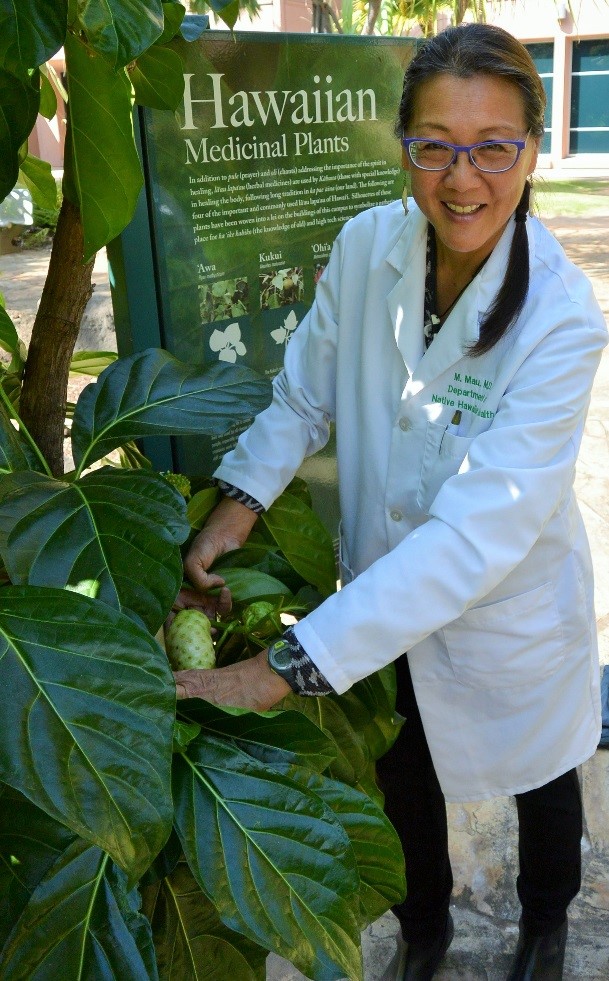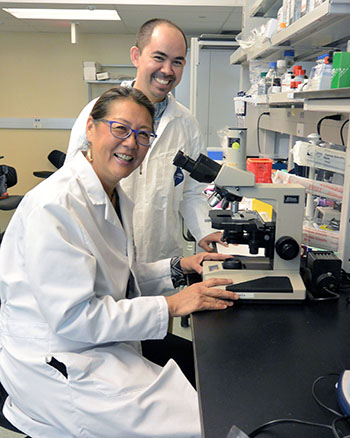The Center for Native and Pacific Health Disparities Research Walks Beside, Not In Front of, Diverse Hawaiian Communities to Control Diabetes
Native Hawaiians are twice as likely to develop diabetes as Whites living in Hawaii and four times more likely to die of stroke.
These are the kinds of health problems being addressed by the Center for Native and Pacific Health Disparities Research and its network of community partners.
Dr. Marjorie Mau has served as lead principal investigator of the Center since 2002, when it was established with an NIMHD grant at the University of Hawai'i at Mānoa. Her experience growing up in Hawai'i and as the only Native Hawaiian in her medical school class led to a deep passion for working with Hawai'i's communities on the health problems they care about. It also made her passionate about training people in those communities to not only volunteer in a study but also do the research.
"The word 'collaboration' or 'partnership' really doesn't capture the form of community engagement that we use in our Center. We literally walk with our communities–and not in front of them, but beside them," says Dr. Mau. "They're part of just about everything the Center does."

The Center started out by building the Ulu Network of partners at more than 60 sites across Hawaii. These partners included Native Hawaiian healthcare systems, community health centers, Native Hawaiian civic clubs and nonprofits serving Native Hawaiians, and grassroots organizations. The Network later expanded to include other Native populations in the Pacific, such as Alaska Natives and New Zealand Māori.
The Ulu Network groups' long-standing relationship with the Center is built on trust. Representatives from the community help identify the most pressing health problems and decide how best to combat them. And if they choose to work with the Center, partners are held accountable to the joint project.
"They help us ensure that the science is going to be strong–not just scientifically–but also with strong community validity by asking, 'How is that going to translate or transform the lives of the people it's meant to benefit?'" says Dr. Mau.
An example of this approach is the NIMHD-funded Partnership for Improving Lifestyle Interventions (PILI) project. The Center and five community partners, located mostly in low-income urban areas of Honolulu on the island of O'ahu, decided to address obesity. They adapted an existing weight loss education program so it used local language and examples relevant to Native Hawaiian and Pacific Islander communities. The groups also added a program to help participants maintain their weight loss with the support of their family and community.

Researchers from the Center trained local staff members to collect data to find out whether the culturally adapted program worked. And it did: Six months later, participants who stuck with the program were five times more likely to have kept the weight off than were people in the control group, who followed a standard weight maintenance program.
Community training is one of the most enduring parts of the Center's Ulu Network activities, says Dr. Mau. "All of a sudden these young kids are like, 'Wow, I can do this. I never even thought of being a researcher.'"
Dr. Mau notes that while the PILI project went a long way to improve the health of Native Hawaiians and Pacific Islanders, participants could get even further if their doctors worked with them.
For example, in an NIMHD-funded study, Dr. Mau and the research team adapted information about diabetes for her ethnically diverse patients. But the team also went beyond that, creating short modules to teach physicians how to share decision-making with diabetic patients. Dr. Mau explains that by taking part in decisions, such as what medications to use, patients take ownership of their health.
The Center has helped counter the public's negative viewpoints of research. "Most people think that if you participate in research, you're a guinea pig. I think minority populations are very sensitive to that," says Dr. Mau. But since the Center and its Ulu Network partners work toward a common goal, communities know the research will be relevant to them.
And it is equally important for researchers to be accountable to communities. Since research funded by NIH is meant to benefit everyone, Dr. Mau says it only makes sense to work with communities on the issues they care about.
References
- Kaholokula, K. J., Mau, M. K., Efird, J. T., Leake, A., West, M., Palakiko, D. M, . . . & Gomes, H. (2011). A family and community focused lifestyle program prevents weight regain in Pacific Islanders: a pilot randomized controlled trial. Health Education & Behavior, 39, 386-395. doi: 10.1177/1090198110394174.
Posted March 15, 2017

















